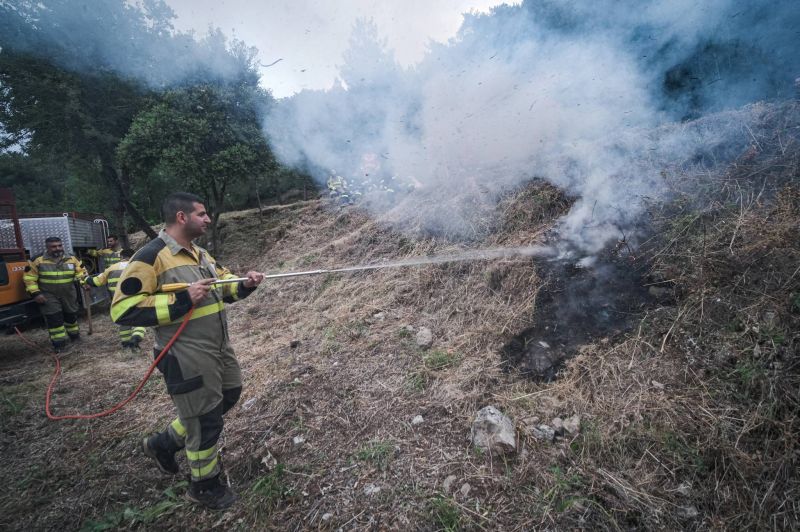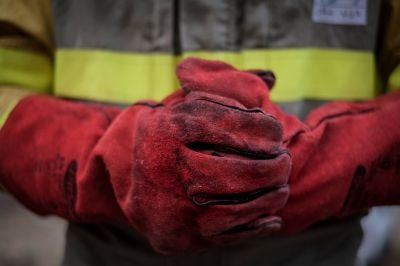
Khaled Taleb, a founder of the Akkar Trail association in Meshmesh, Akkar, shows trainees how to put out a wildfire on a slope. June 3, 2023. (Credit: João Sousa/L’Orient Today)
BEIRUT — Tuesday was the world’s hottest day on record, according to US meteorologists, harkening high temperatures that are already intensifying Lebanon's summer wildfire season.
“It means we have more challenges to deal with, specifically in the forest sector,” said Dr. George Mitri, director of the Land and Natural Resources Program at the University of Balamand. The program analyzes forest fires across Lebanon and runs an online platform tracking wildfire risks based on weather data.
Wednesday’s daily report on the online platform listed rural northeastern Akkar governorate, which is covered with remote, dense pine forests, as at “extreme danger” of wildfires.
On July 4, scientists with the US National Oceanic and Atmospheric Administration (NOAA) logged the planet's average air temperature at 17.18 Celsius (62.9 degrees Fahrenheit) — a record high. The previous record was set just one day earlier.
“Higher temperatures mean more evapotranspiration from the vegetation level,” explained Mitri — in laymen’s terms, drier and more flammable plants. This can be dangerous for forests, he added.
“The second we have any source of fire, we can have very quick ignition of flames … and it can spread to very large areas, like the fires we are seeing in Akkar.”
The Environment Ministry is coordinating with municipalities and local groups to encourage the removal of the overgrown grasses and fight fires, including providing case-by-case emergency funds for firefighting teams, Environment Minister Nasser Yassin told L’Orient Today.
Recent weeks have seen near-daily wildfires in Lebanon, particularly in Akkar governorate where public funding and equipment shortages for the Civil Defense mean some volunteer groups are also stepping in to help.
A massive wildfire last month in the mountainous Sinn region of Akkar burned 90 hectares of forest, ravaged centuries-old trees and damaged some homes.
More than 200 volunteers spent two days putting out the blaze, the worst so far this year, according to Akkar Trail, a hiking guide group that also runs a volunteer forest firefighter team.
It’s still early to tell whether the 2023 season will be worse than 2022, but last month’s Akkar blaze “definitely raised the alarm,” said Yassin.
“Just today there were two fires” in rural Akkar, Khaled Taleb, founder of the Akkar Trail group, told L’Orient Today by phone on Wednesday. A late winter last year meant widespread, tall grasses amid the trees, which have now dried up into potent fuel for wildfires. “That’s what we are seeing this year,” Taleb added.
“To burn grass you need just seconds,” explained Mitri. “It burns and then the fire spreads to neighboring forests.”
Devastating fires are no stranger to Akkar governorate, where a 2021 massive blaze killed a teenage boy and three million trees. Since then, volunteer groups like Akkar Trail have undergone training and funding drives for more equipment, and the Environment Ministry issued a national wildfire strategy that focuses on local readiness.
The 2023 strategy was the first updated wildfire plan since 2009, Yassin said, and focuses on coordination with local authorities to monitor and put out blazes. The ministry also hopes to launch a national emergency fund by the end of the year.
Meanwhile, says Taleb, the huge summer spread of tall, dry grasses means fires are entering “into the heart of forests,” including those containing Lebanon’s iconic cedars and pines.
“We haven’t had to cope with this amount and height [of such grasses] before.”
